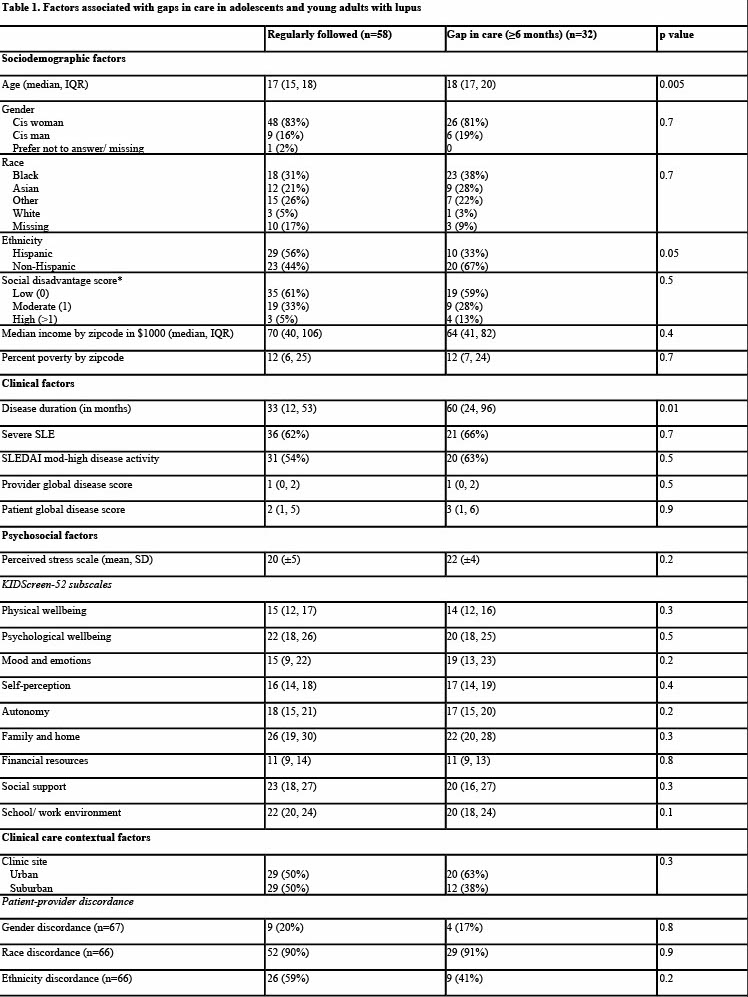Session Information
Session Type: Poster Session B
Session Time: 10:30AM-12:30PM
Background/Purpose: Adolescents and young adults (AYA) with systemic lupus (SLE) are at an especially high risk for disengagement in care, a possible cause of the high morbidity and mortality observed in this population. Our study aims to investigate the potential risk factors that may be contributing to significant gaps in clinical care. Prior literature in adults with SLE indicates that measures of social disadvantage and minority race/ethnicity are associated with lower retention in care. Less is known about AYA with SLE. We investigated sociodemographic, clinical, psychosocial, and contextual factors in association with a gap in lupus clinical care of ≥6 months.
Methods: We examined baseline data from a prior study of AYA with SLE, ages 12-21, recruited from outpatient clinics within two different hospital systems. Participants completed REDcap surveys on socio-demographics, patient reported disease activity, quality of life and other psychosocial factors, and factors relating to clinical context. Further clinical data was collected from the electronic medical record. Visit data from the 2-year study period was used to identify gaps ≥ 6 months with no lupus visits. Chi-square tests for categorical variables and student t-tests and Wilcoxon rank sum tests for parametric and non-parametric continuous variables were used to identify potential factors associated with the development of at least one gap in care. Multivariable logistic regression models were constructed to identify factors that were independently associated with gaps in care.
Results: Among the 90 participants for which we were able to extract visit data on, 32 (36%) had ≥1 gap in care. Among the sociodemographic variables, only age was associated with gaps in care, though a smaller proportion (approaching significance) of participants identifying as Hispanic had gaps in care. Among the clinical factors, only greater disease duration was associated with gaps in care. The psychosocial factors were not significantly different between participants who went on to have gaps in care vs those who did not; however, perceived stress and autonomy, school/work environment, and mood and emotions subscales of the KIDScreen quality of life index all showed a trend toward worse functioning in youth with gaps in care. The contextual factors investigated were not associated with gaps in care; ethnicity discordance between patients and providers trended toward significance but was highly correlated with Hispanic ethnicity. In the final multivariable model only baseline age and disease duration were found to be independent predictors; each year increase in age was associated with a 31% increased odds (aOR 1.31, 95% CI 1.02-1.67) and each month increase in disease duration was associated with a 17% increased odds (aOR 1.17, 95% CI 1.01, 1.38) of developing a gap in care.
Conclusion: Gaps in lupus care are prevalent in adolescents and young adults. Older age and longer disease duration may contribute to greater risk for gaps in care. While other sociodemographic, clinical, psychosocial and contextual factors may play a role, further investigations in larger cohorts and with longitudinal data may better identify which contribute to gaps in care and help identify targets to improve care.
To cite this abstract in AMA style:
Rubinstein T, Dave A, Calistro T, Rapoza K, Hui-Yuen J, Masi E, Berkowitz S, Mian Z, Kenney-Riley K. Investigating Factors Associated with Gaps in Care in Adolescents and Young Adults with Systemic Lupus [abstract]. Arthritis Rheumatol. 2024; 76 (suppl 9). https://acrabstracts.org/abstract/investigating-factors-associated-with-gaps-in-care-in-adolescents-and-young-adults-with-systemic-lupus/. Accessed .« Back to ACR Convergence 2024
ACR Meeting Abstracts - https://acrabstracts.org/abstract/investigating-factors-associated-with-gaps-in-care-in-adolescents-and-young-adults-with-systemic-lupus/

